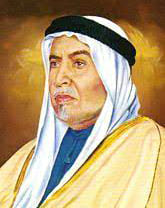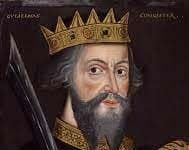Learn about Abdullah Al-Salem Al-Sabah (1950-1965), the 11th Emir of Kuwait, known as the “Father of the Constitution”. Learn about his important role in Kuwait’s independence, constitutional reforms, economic modernization, and social development.
Abdullah Al-Salem Al-Sabah
Sheikh Abdullah Al-Salem Al-Sabah was the King of Kuwait, who ruled the country from 1950 until his death in 1965. He was born on June 24, 1912, and was the sixth son of Sheikh Salem Al-Mubarak Al-Sabah, who was the founder of the modern State of Kuwait.
Sheikh Abdullah Al-Salem Al-Sabah was educated in Kuwait and in the United Kingdom, where he received a degree in Political Science and Economics. He was known for his progressive vision and his commitment to modernizing Kuwait. He was also known for his strong leadership skills and his diplomatic approach to solving problems.
In 1950, Sheikh Abdullah Al-Salem Al-Sabah became the Ruler of Kuwait after the death of his brother, Sheikh Ahmad Al-Jaber Al-Sabah. During his reign, he worked to modernize the country’s infrastructure, including the construction of new roads, schools, and hospitals. He also established the country’s first airport and the Kuwait Oil Company, which was the cornerstone of the country’s economic development.
In addition to his domestic policies, Sheikh Abdullah Al-Salem Al-Sabah was also active in regional and international affairs. He was a strong advocate for Arab unity and worked to improve relations between Kuwait and other Arab countries. He was also a key player in the formation of the Gulf Cooperation Council (GCC), which was established in 1981 to promote cooperation and economic development among the Gulf States.
Sheikh Abdullah Al-Salem Al-Sabah passed away on November 24, 1965, and was succeeded by his brother, Sheikh Sabah Al-Salem Al-Sabah. He is remembered as one of Kuwait’s greatest leaders, who played a key role in transforming the country into a modern state. 0 0 0.
Abdullah Al-Salem Al-Sabah: Comprehensive Biography
Full Name: Abdullah Al-Salem Al-Sabah
Born: 1895
Death: 24 November 1965
Ruled as Emir: 25 February 1950 – 24 November 1965
Dynasty: Al-Sabah
Nationality: Kuwaiti
Introduction
Abdullah Al-Salem Al-Sabah was the 11th ruler (emir) of Kuwait and the first emir to implement significant political, economic and social reforms that shaped the country as a modern state. Known as the “Father of the Constitution”, his reign marked a historic turning point in Kuwait’s history. He is widely known for transforming Kuwait into a constitutional state and laying the foundations of its modern political and economic institutions.
Early life and background
Born in 1895 into the ruling Al-Sabah family, Abdullah Al-Salem grew up when Kuwait was a small trading and pearling center under British protection. Not much is recorded about his early life, but he was known to have a keen interest in governance and the well-being of his people.
Prior to ascending the throne, Abdullah Al-Salem held important leadership roles within the Kuwaiti government, where he demonstrated his ability to lead and his commitment to the nation’s development.
Accession to power
Abdullah Al-Salem became Emir of Kuwait on February 25, 1950, following the death of his cousin Ahmad Al-Jaber Al-Sabah. His accession came at a crucial time when Kuwait was transitioning from a traditional economy based on trade and pearl mining to a modern economy driven by oil wealth.
Key Achievements and Reforms
1. Father of the Constitution: One of Abdullah al-Salem’s most notable achievements was the establishment of Kuwait’s first written constitution in 1962. This document transformed Kuwait into a constitutional monarchy, balancing the authority of the emir with that of a democratically elected National Assembly (parliament). This move laid the foundation for political accountability and public participation in governance.
2. Economic Transformation: Under Abdullah al-Salem’s leadership, Kuwait experienced an economic boom due to its booming oil industry. He implemented policies to channel oil revenues into national development, including building modern infrastructure, schools, hospitals, and housing projects. These investments raised the standard of living of Kuwaiti citizens and helped diversify the economy.
3. Independence from British tutelage: Abdullah al-Salem played a key role in Kuwait’s independence from British tutelage. On June 19, 1961, Kuwait officially became a fully sovereign state. Abdullah Al-Salem skillfully steered the transformation, ensuring that Kuwait could maintain its stability and independence while fostering strong ties with the global community.
4. Regional and International Diplomacy: As a statesman, Abdullah Al-Salem worked tirelessly to strengthen Kuwait’s relations with neighbouring Arab states and the broader international community. He also guided Kuwait to become a founding member of the Gulf Cooperation Council (GCC) and an active member of the United Nations, further strengthening the country’s presence on the global stage.
5. Social Development: Abdullah Al-Salem prioritized improving the quality of life of Kuwait’s citizens. He invested heavily in education, building new schools and expanding access to learning opportunities for both men and women. Health services were also expanded during his reign, with new hospitals and clinics established across the country.
Challenges during his reign
Abdullah al-Salem’s reign was not devoid of challenges. Following Kuwait’s independence in 1961, Iraq made territorial claims over Kuwait, creating a tense political situation. However, Abdullah al-Salem’s diplomacy and reliance on international support ensured that Kuwait’s sovereignty remained intact.
Additionally, managing the rapidly increasing flow of oil wealth and transitioning from a traditional to a modern economy posed significant challenges. However, Abdullah al-Salem’s leadership and foresight helped the country successfully navigate this critical period of change.
Personal qualities and leadership style
Abdullah al-Salem was known for his visionary leadership and sense of duty to his people. He was modest, far-sighted, and deeply committed to the principles of justice and equality. His emphasis on constitutional governance and transparency set him apart from many of his contemporaries in the region.
Death and Legacy
Abdullah al-Salem died on November 24, 1965, while he was still in office. His death ended a transformative era for Kuwait, but his legacy continues to influence the country today.
Abdullah Al-Salem Al-Sabah: Brief Overview
Intro
| Aspect | Details |
|---|---|
| Full Name | Abdullah Al-Salem Al-Sabah |
| Born | 1895 |
| Died | 24 November 1965 |
| Reign | 25 February 1950 – 24 November 1965 |
| Dynasty | Al-Sabah |
| Nationality | Kuwaiti |
Key Achievements
| Category | Details |
|---|---|
| Father of the Constitution | Introduced Kuwait’s first written constitution in 1962, establishing a constitutional monarchy. |
| Economic Transformation | Used oil revenues to modernize infrastructure, education, healthcare, and housing. |
| Gaining Independence | Secured Kuwait’s independence from British protection on June 19, 1961. |
| Social Reforms | Expanded education and healthcare access, improving citizens’ quality of life. |
| Diplomacy | Strengthened ties with Arab nations and the global community, ensuring Kuwait’s sovereignty. |
Frequently Asked Questions About Abdullah Al-Salem Al-Sabah
1. Who was Abdullah Al-Salem Al-Sabah?
Abdullah Al-Salem Al-Sabah was the 11th Emir of Kuwait (1950-1965) and is celebrated as the “Father of the Constitution” for introducing Kuwait’s first written constitution and establishing a constitutional monarchy.
2. What role did Abdullah Al-Salem play in Kuwait’s independence?
He freed Kuwait from British protection on June 19, 1961, making Kuwait a fully sovereign state.
3. What were Abdullah Al-Salem’s contributions to Kuwait’s economy?
Under his reign, Kuwait’s oil wealth was used to modernize the country, building infrastructure, schools, hospitals and housing, and raising the country’s standard of living.
4. Why is Abdullah Al-Salem called the “Father of the Constitution”?
He introduced Kuwait’s first constitution in 1962, creating a constitutional monarchy with a parliamentary system that ensured political accountability and public participation in governance.
5. What is Abdullah Al-Salem’s legacy?
He is remembered for his visionary leadership, Kuwait’s independence, constitutional reforms, and modernization efforts, which laid the foundation for the country’s prosperity.
Sources:
- “Kuwait: Crossroads of the Arabian Peninsula”, by Mary Ann Tétreault”A Political and Economic Dictionary of the Middle East”, edited by Michael Ryan
- “The Gulf States: A Modern History”, by Abdul Rahman Al-Faris”The History of Kuwait”, by N.A. Al-Hashem
- “Kuwait: A Country Study”, by Federal Research Division, Library of Congress.
N.B. The article originally belongs to the book ‘Brief Biographies of Eminent Monarchs‘ by Menonim Menonimus.
Books of Biography by M. Menonimus:
- The World Writers-Brief Biographies
- Introduction to World Writers
- Introduction to World Personalities
- Love of Reputed Persons
- Brief Biographies of Ancient Thinkers and Writers..
Additional Searches:
- Famous Kings and Queens
- Living Biographies of Famous Rulers
- Biography of Elizabeth II
- Most Famous Kings in History











